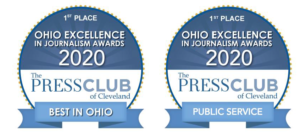
Let’s talk about Failing Schools
I don’t know about you, but I for one am sick of hearing the anti-public school candidates, Drake, Lynn, Reinnert refer to the Cleveland Heights-University Heights School system as “Failing”. It is completely fair to ask that every tax dollar be spent wisely and to look for cost savings wherever possible and that part of their platform is valid. But pretending that the CH-UH school district is in some way getting what it deserves for running a “failing” school district, shows a complete lack of preparation in understanding how to evaluate performance of educators and educational institutions and, in my opinion, disqualifies them as candidates for School Board. Anyone that wants to declare the CH-UH school system as “failing” had better have done some homework and at a minimum have very good answers to the following questions:
- If the state report cards are an accurate indicator of school quality, why are the grades so highly correlated with parental income?
It is well known that student achievement is highly correlated with both parental educational achievement and parental income. Any metric that wishes to compare educational institutions must first account for differences in the student bodies of the institutions they are comparing. By ignoring differences in the student bodies across districts, the state report card misattributes high achievement in wealthy districts to school quality, when it is really just the natural consequence of having a highly educated and wealthy community (Link). As a result, the state report cards grades are directly correlated with parental income. It tells you nothing about the quality of the school district, it only tells you the median income of the students attending your schools. This effect is exacerbated in Cleveland Heights, because although the median household income in Cleveland Heights is pretty close to the median household income for all of Ohio, many of the wealthy parents in Cleveland heights elect to send their children to private schools, so the parental income of the student population is far lower than the median household income of the community.
- What evidence is there that private/community schools add more value that CH-UH.
What did your private school get on the state report card? That’s right, you don’t know, because they aren’t assessed. But charter schools are, and in 2018 and 2019, the last two year that the State sent report card grades) Constellation Community School System that Charles Drake seems to be so proud of being involved in has a higher percentage of schools with an F on the state report card than CH-UH. (2019 data) (2018 data).
What happens when students take vouchers to go to private schools? Well according to the Fordham Institute, one of the biggest school choice advocates in the country, students that elect to take vouchers to go to private schools actually do substantially worse than those that skip the vouchers and stay in public schools (link). So, if children do better in “failing” public schools than they do in private schools… who’s failing?
Does your private school publish reliable value-add metrics that take into account the demographics of the student body? Most don’t because they don’t want people to know the dirty little secret, that they don’t add nearly enough value to justify their cost, and in most cases don’t add more value than the local public school. In fact several studies confirm that private schools provide no educational benefit over public schools, they just take credit for differences in the demographics of their students (Link).
If you didn’t bother to ask your private school questions like “what is the median income of the incoming student body”, “what are your SAT scores compared to national averages for that income range?”, “What value-add metrics do you use and how do you score compare to local competition?”, then guess what… you don’t care about school performance. What you care about is changing the demographics of the student body your child goes to school with.
If we want to talk about efficient use of funds, or the appropriate ways of measuring student success or institutional value-added, I think those issues are fair game, but shouting “Failing Schools” at every opportunity as some type of evidence that the district deserves to be punished shows an academic laziness that is unacceptable for people seeking decision making authority over our schools. Its time to retire that phrase, the political aspirations of school board candidates that use it, and the candidacy of Garry Kanter who supports them (Link).



You need to correct this.
Garry Kanter has never referred to the CHUH district schools as “Failing”.
I apologize Garry. I could have sworn that you used that phrase on next door, but I cannot find a reference to it.
I think that your support of the candidates that do use that phrase is a valid thing to mention, but I will request an edit removing your name from association using the direct phrase.
For political purposes, you falsely accused me of saying something I’ve never said.
You got it wrong. You acknowledged it. Don’t make excuses.
Just remove my name from the whole thing. The facts don’t fit your hateful narrative, no matter how hard you strain.
This community doesn’t need your monkey business:
http://www.heightsobserver.org/read/2021/10/26/remember-just-say-no-to-political-deals
I corrected it. It is accurate as it stands. I don’t have to remove you from it because you don’t like it. The narrative isn’t hateful and I’ve sited sources that support my narrative. You made a choice to support who you support and your actions have consequences.
You’re correct that schools don’t fail per se; students fail. However, a huge percentage of CHUH students fail. The mission of the schools is to prevent that, and in that sense, the schools have failed. Further, they’ve failed to prevent student failure while spending more per pupil than the tuition of 4 of the regions top ten private schools. What does this tell us?
It tells us that spending still more will probably not make a difference, and lo and behold, since you’re so fond of correlations regarding student performance Max, there is ZERO correlation between school spending and student outcomes. Zero, nada, zip. The candidates you hate so much are not anti-public school, they’re just anti-throwing still more money down a hole when doing so has been shown not to produce results. You, yourself point out that the highest correlation is parental education (income is a secondary correlation because educated people earn more.) So, maybe the lesson here is that spending twice as much as the average district won’t put a dent in that correlation you tout so loudly. The point of the candidates you hate is to stop throwing money at a problem that money won’t solve.
By the way, about those state report cards – they’re an EXCELLENT measure for parents deciding where to educate their kids. When I was in college, I learned as much from casual discussions with my fellow students both academically and in terms of life wisdom, as I did from my classes. The peer cohort in which a student is immersed matters. If the school report card measures nothing more than the percentage of a school’s student body that come from families that value and embrace education, then it has done its job.
Thanks for your comment. It appears that we agree on a few things.
We appear to agree that that the state report cards do not assess the quality of the institution but the composition of the student body.
You happen to think that an assessment that only tells how wealthy the student body’s parents are is valuable so that you can send your children somewhere with wealthier parents. That is certainly your choice, but I do t think it should be the community’s/state’s responsibility to subsidize that decision.
The rest of what you’re saying is either vague or speculative. You say the students schools are failing to prevent students from failing. I’m not sure what you mean specifically. But the studies that I sighted (from a very pro-school choice group) showed that students that take vouchers to go to private schools do far worse than those that stay in public schools. So the people that are making that decision want to send their kids to schools with different demographics so badly that they are willing to spend a lot of money AND get worse test scores. If people were concerned about the quality of the institution they would ask for the value-add data from the private schools they attend, and that data would be made public to allow the schools to justify the costs. But they don’t publish that data because they don’t add value and people don’t ask, because people don’t care.
As for the value of the conversations that you had with people you believe to be of higher caliber or more enriching to your life than those you find in chuh schools perhaps that’s true. But it is certainly anecdotal. And I can say anecdotally that I valued my experience with the student body at heights when I went there and I think it enriched me and prepared me better for my career than I would have been at the private school that my brother attended.
As for whether funding improves results. Please cite your zero correlation source. I have seen several that do in fact correlate spending with results.
And while I do agree with you that the spending is high and that we should consider ways to achieve some efficiency, I do not think that the candidates recommendations of no levies ever, reductions in teacher compensation, and increased services to private schools were helpful and neither were their characterization of the schools.
You’ve distorted much of what I’ve said.
The State Report cards do not measure the composition of the student body. They measure aggregate student achievement. Student achievement is the result of a combination of factors, some from the institution and some from the students. The single greatest predictor of student achievement is the value the student places on learning, and on the material being taught. The school plays a role, but the school’s role is to lead a horse to water. The parents’ role is to present horses that are thirsty. The best indicator that parents value education is how much education they have attained, and yes, the entire reason we’re even talking about education is that it leads to higher earning. Thus the SECONDARY correlation with household wealth. The real causality lies not in the wealth, but in the sort of choices that correlate with parental education and, again SECONDARILY with wealth – do they keep books in the home, do they read to their children, do children see their parents reading, the patterns of media usage in the home, etc.
An assessment that reveals the degree to which the student body values education is absolutely valuable, because peer cohort is a huge factor in determining educational outcomes. You say you valued your conversations at Heights High – WHICH Heights High? It’s widely known that Heights High students gravitate toward one of two peer cohorts at the school, which are colloguially called Private Heights High, and Gen Pop (a prison abbreviation of General Population.) Most High Schools have a similar social bifurcation; the report cards reveal what percentage of the student body falls on each side of it. Sending one’s kids to a district with a high percentage of high achieving students is no guarantee of success, but we all know which way the oddsmakers in Vegas would lean, and they didn’t get super rich by making bad bets. The value of a student’s peer cohort is far from anecdotal.
“You say the students schools are failing to prevent students from failing. I’m not sure what you mean specifically.”
Come on Max, I looked you up, you’re WAY smarter than that. The schools’ mission is to educate. If a student comes out the other end uneducated.that’s a mission failure, ESPECIALLY in the context of your implied denial of my points about the parental role. We can debate the causes of the failure until the cows come home, but the bottom line is, student failure is a mission failure for the schools. Their mission is to facilitate student success. Maybe you don’t want to count it as failure because of mitigating factors that you believe make that failure inevitable. OK, fine, but the definition of insanity is doing the same thing and expecting a different result. For 40 years, in CHUH they’ve been doing the same thing – throwing mountains of money at the problem from an institutional perspective. Newsflash – it’s not working.
Private schools, provide plenty of value-add data to prospective clients, including the percentage of grads who go on to top tier universities (one of which you chose to attend in complete denial of your overall narrative here.) Many of my relatives attended a K-12 parochial school that regularly publishes how much in merit scholarships their graduating seniors garner. The success of private schools is well documented, and it’s required by the market. If a private school fails to perform, it loses students and it goes broke, because unlike CHUH, it doesn’t get to have the government forcibly confiscate its next year’s funding from the populace. People do ask, and if you had to personally shell out the $28K/year that CHUH spends (which is more than 4 of NEOhio’s top 10 private schools charge in tuition) from your own pocket for your kid to attend, you’d probably take a much more critical look at CHUH’s value-add data – it sucks.
I’ll gladly cite my zero correlation source. The Ohio Dept. of Education annually publishes the financial and performance data for every district in the state. Choose ANY year, and plot per pupil spending against any valid quantitative measure of aggregate student outcomes. It’s a random cloud of points. Max, I’ve been examining the CHUH spending issue and school funding in general since the early 90’s. Let me ask you, Max, without any research, can you explain the difference in how HB 920 impacts permanent versus fixed term levies? Because I’ve met quite a fewe school board members, in CHUH and elsewhere, who can’t. Do you know the historic relation ship between CHUH’s enrollment versus its administrative headcount? (as enrollment has steadily dropped, administrative headcount has gone up.) Did you know that CHUH’s board openly insulted the intelligence of a consultant who presented a bid to take over their food services, and that consultant went on to, at another district, increase voluntary participation in the lunch program to over 90% while returning enough surplus to the general budget to fund two additional teacher positions? Have you done the math that clearly shows that each voucher issued to a CHUH resident actually INCREASES CHUH’s per pupil budget? Have you been shown a binder 2″ thick of police reports for rapes at Heights High that the administration swept under the rug, a binder assembled AND presented to the superintendent, who dismissed it, at least 3 years BEFORE the “rape academy” walkout event by students?
I also know those candidates you so despise, and I’ve actually advised some of them on policy points. You grossly misstate their positions. They have called for reductions in ADMINISTRATIVE head count, fixed term levies which allow inflation indexing without increasing millage, contracting out ancillary services, and liquidating unutilized district real estate holdings at market rate. But please, don’t let any facts interfere with your narrative.